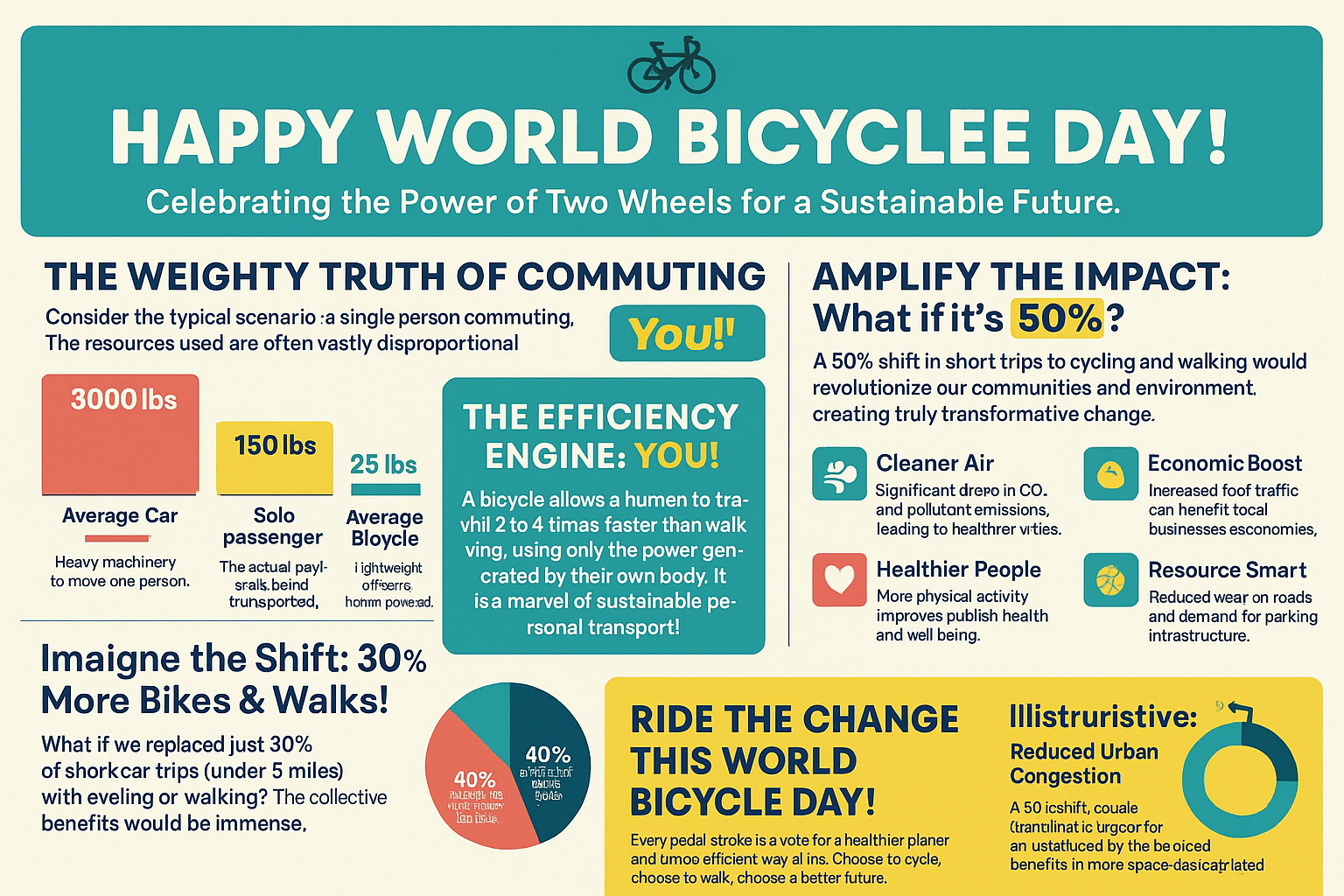World Bicycle Day: The Amazing Efficiency of Cycling for a Greener Planet
World Bicycle Day, Efficiency of Two Wheels
As we mark World Bicycle Day, let’s consider the profound impact of leveraging our own human power. The bicycle, a stunning example of Perpetual Innovation, not only showcases incredible cycling efficiency but also invites us to rediscover the joys and advantages of walking and biking as transformative modes of transport.
The Unmatched Efficiency of Human Power
In a world grappling with resource depletion and climate change, the bicycle stands out as a beacon of efficiency. Think about it: a car, weighing anywhere from 2,000 to a staggering 4,000 pounds (or 900 to 1800+ kilograms!), is often used to transport a single person weighing, say, 150 pounds (around 68 kg). That’s an incredible amount of steel, plastic, and energy dedicated to moving a relatively small payload. The energy input required to manufacture, fuel, and maintain such a vehicle is immense.
Now, consider the bicycle. Weighing typically between 15 to 30 pounds (7 to 14 kg), it leverages the rider’s own power with remarkable effectiveness. The energy conversion is direct and incredibly efficient. You are the engine, and the fuel is your breakfast! This isn’t just about saving money on gas; it’s about a fundamental respect for energy and resources. The bicycle is a marvel of engineering that allows a human to travel three to four times faster than walking, using only the power generated by their own body. In terms of calories burned per passenger-mile, cycling is vastly more efficient than driving, and often even more so than walking for longer distances.
Imagine the Savings: A 30% or 50% Shift
The dominance of car culture for even the shortest trips has significant consequences. But what if we made a conscious shift? What if, as a society, we aimed to replace just a fraction of these car journeys with walking or cycling?
- If we walked or biked for 30% of our short trips (those under, say, 5 miles):
- Reduced Emissions: The collective drop in CO2 and other pollutant emissions would be substantial. Many sources indicate that shifting short car trips to cycling can reduce an individual’s transport-related carbon footprint significantly. Imagine millions making this change – the air in our cities would be cleaner, and our contribution to climate change lessened.
- Fuel Savings: Less driving means less fuel consumed. This translates to direct financial savings for individuals and a reduced national demand for fossil fuels.
- Healthier Communities: More physical activity would lead to improved public health outcomes, potentially reducing healthcare costs.
- Less Congestion: Fewer cars on the road, especially during peak times, means less traffic, quicker commutes for those who still need to drive, and more pleasant urban environments.
- Now, let’s be ambitious. What if we hit a 50% shift for those short trips?
- The benefits outlined above would be amplified dramatically. We’d be looking at a transformative impact on urban air quality, a significant dent in transportation-related greenhouse gas emissions, and a population that is more active and healthy.
- Resource Conservation: Think of the reduced wear and tear on roads, the decreased demand for parking spaces (freeing up land for green spaces or housing), and the lower consumption of materials needed for car manufacturing and maintenance.
- Economic Shifts: Local economies could benefit as people cycling and walking are more likely to stop and shop at local businesses.
The beauty of the bicycle is its simplicity and accessibility. It’s a tool for individual empowerment and collective good. It promotes health, reduces our environmental footprint, and offers an economically sound alternative for many of our transportation needs.
This World Bicycle Day, let’s not just celebrate the bicycle itself, but also the profound potential it holds for a more sustainable and efficient future. Maybe take a ride today, and consider which of your regular trips could be made on two wheels instead of four. The savings – for our planet, our communities, and ourselves – are too significant to ignore.
Look at this infographic. Note all the savings in time and money, as well as the benefits to the community and the environment.
Happy World Bicycle Day!
Celebrating the Power of Two Wheels for a Sustainable Future.
The Weighty Truth of Commuting
Consider the typical scenario: a single person commuting. The resources used are often vastly disproportional to the task.
Average Car
Heavy machinery to move one person.
Solo Passenger
The actual ‘payload’ being transported.
Average Bicycle
Lightweight, efficient, human-powered.
The Efficiency Engine: You!
A bicycle allows a human to travel 3 to 4 times faster than walking, using only the power generated by their own body. It’s a marvel of sustainable personal transport!
Imagine the Shift: 30% More Bikes & Walks!
What if we replaced just 30% of short car trips (under 5 miles) with cycling or walking? The collective benefits would be immense.
Cleaner Air
Significant drop in CO2 and pollutant emissions, leading to healthier cities.
Fuel Savings
Less driving means direct financial savings and reduced fossil fuel dependence.
Healthier People
More physical activity improves public health and well-being.
Less Congestion
Fewer cars mean smoother traffic and more pleasant urban spaces.
Economic Boost
Increased foot traffic can benefit local businesses and economies.
Resource Smart
Reduced wear on roads and demand for parking infrastructure.
Amplify the Impact: What if it’s 50%?
A 50% shift in short trips to cycling and walking would revolutionize our communities and environment, creating truly transformative change.
Key Benefits Magnified:
- Drastic Emission Cuts: A major step towards climate goals.
- Vibrant Local Economies: More community interaction and local spending.
- Healthier Lifestyles Normalized: Active transport becomes the default.
- Quieter, Safer Streets: Enhanced quality of urban life.
- Significant Infrastructure Savings: Less need for car-centric development.
Illustrative: Reduced Urban Congestion
A 50% shift could dramatically reduce traffic, as visualized by the potential for more space dedicated to people and green areas.
Ride the Change This World Bicycle Day!
Every pedal stroke is a vote for a healthier planet and a more efficient way of life. Choose to cycle, choose to walk, choose a better future.
#WorldBicycleDay #EnergyEfficiency #PerpetualInnovation #SustainZine #BetterTransportation #LowerCarbonFootprint


